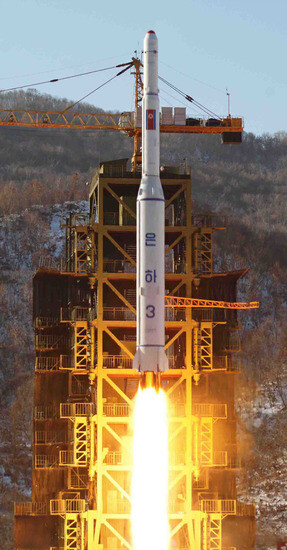hankyoreh
Links to other country sites 다른 나라 사이트 링크
N. Korea’s recent actions break precedent, suggest importance of domestic considerations

North Korea’s approach to its planned launch of the Gwangmyeongseong earth observation satellite is different from similar efforts in the past. Typically, the country has followed a procedure of delivering an advance message and notifying international organizations, and then performing a nuclear test once the rocket has been launched and sanctions have been imposed by the United Nations Security Council (UNSC).
This time around, the fourth nuclear test came first, on Jan. 6. That test also marked a break from precedent, with no reported prior notification to China or the US. No official announcement was made for the rocket launch plan, nor was it reported by the Korean Central News Agency (KCNA), North Korea’s official news service, or other North Korean media. There was only a notification to the International Maritime Organization (IMO) that an “earth observation satellite” would be launched between Feb. 8 and 25. Also unusual was the decision to announce the launch plans amid ongoing discussions of UNSC sanctions in response to the nuclear test.
Many observers read this as a carefully planned strategic choice. To begin with, the prevailing view among experts is that the launch is intended as a domestic measure to rally the North Korean public ahead of the 7th Congress of the Korean Workers’ Party in May.
“Given that the rocket launch plan came at a time when the UNSC hadn’t imposed sanctions and China’s senior representative to the six-party talks Wu Dawei was visiting, it looks as though internal motivations were a bigger variable than external considerations,” said Chang Yong-seok, a senior researcher at the Seoul National University Institute for Peace and Unification Studies.
Jin Jingyi, a professor at Peking University in China, said the planned launch “looks intended as a domestic event to show off two achievements with its ‘hydrogen bomb’ and ‘satellite launch’ ahead of the seventh congress, for the political purpose of helping establish a stable power base for the Kim Jong-un regime.”
The framing as a “satellite launch” also appears to be intended for domestic consumption, analysts said.
“If they put off the launch until after the UN sanctions, it comes across as though they’re admitting that it’s a weapon,” said Kim Dong-yeop, a research professor at the University of North Korean Studies.
“It appears to be a conscious choice to play up the ‘peaceful space development’ angle,” Kim said.
Others suggested the move may be part of a careful strategy in response to possible UNSC sanctions over the test. Given the need for ballistic missile technology after its nuclear test, analysts said, the country opted to announce its rocket test now after concluding that it would be better to take sanctions all at once rather than have two separate UNSC measures.
A third interpretation is that the planned launched is meant to influence the international community’s responses.
“The argument that sanctions are pointless is only going to gain further traction [after the rocket launch],” predicted Jeong Se-hyun, a former Minister of Unification and permanent director of the Korea Peace Forum.
“With China’s hands also tied, it’s going to find itself in a situation where it’s strongly recommended that the US pursue a peace agreement with North Korea,” he added.
Shi Yinhong, a professor at Renmin University of China in Beijing, said the rocket launch is “likely to result in the conflict between China and the US over sanctions growing too big for any resolution on long-term measures to emerge.”
By Kim Jin-cheol, staff reporter, and Seong Yeon-cheol, Beijing correspondent
Please direct questions or comments to [english@hani.co.kr]

Editorial・opinion
![[Column] Park Geun-hye déjà vu in Yoon Suk-yeol [Column] Park Geun-hye déjà vu in Yoon Suk-yeol](https://flexible.img.hani.co.kr/flexible/normal/500/300/imgdb/original/2024/0424/651713945113788.jpg) [Column] Park Geun-hye déjà vu in Yoon Suk-yeol
[Column] Park Geun-hye déjà vu in Yoon Suk-yeol![[Editorial] New weight of N. Korea’s nuclear threats makes dialogue all the more urgent [Editorial] New weight of N. Korea’s nuclear threats makes dialogue all the more urgent](https://flexible.img.hani.co.kr/flexible/normal/500/300/imgdb/original/2024/0424/7317139454662664.jpg) [Editorial] New weight of N. Korea’s nuclear threats makes dialogue all the more urgent
[Editorial] New weight of N. Korea’s nuclear threats makes dialogue all the more urgent- [Guest essay] The real reason Korea’s new right wants to dub Rhee a founding father
- [Column] ‘Choson’: Is it time we start referring to N. Korea in its own terms?
- [Editorial] Japan’s rewriting of history with Korea has gone too far
- [Column] The president’s questionable capacity for dialogue
- [Column] Are chaebol firms just pizza pies for families to divvy up as they please?
- [Column] Has Korea, too, crossed the Rubicon on China?
- [Correspondent’s column] In Japan’s alliance with US, echoes of its past alliances with UK
- [Editorial] Does Yoon think the Korean public is wrong?
Most viewed articles
- 1[Column] Park Geun-hye déjà vu in Yoon Suk-yeol
- 2Thursday to mark start of resignations by senior doctors amid standoff with government
- 3N. Korean hackers breached 10 defense contractors in South for months, police say
- 4[Editorial] New weight of N. Korea’s nuclear threats makes dialogue all the more urgent
- 5Will NewJeans end up collateral damage in internal feud at K-pop juggernaut Hybe?
- 6Kim Jong-un expressed ‘satisfaction’ with nuclear counterstrike drill directed at South
- 7[Editorial] Japan’s rewriting of history with Korea has gone too far
- 8[Column] ‘Choson’: Is it time we start referring to N. Korea in its own terms?
- 9[Cine feature] A new shift in the Korean film investment and distribution market
- 10[Column] The clock is ticking for Korea’s first lady